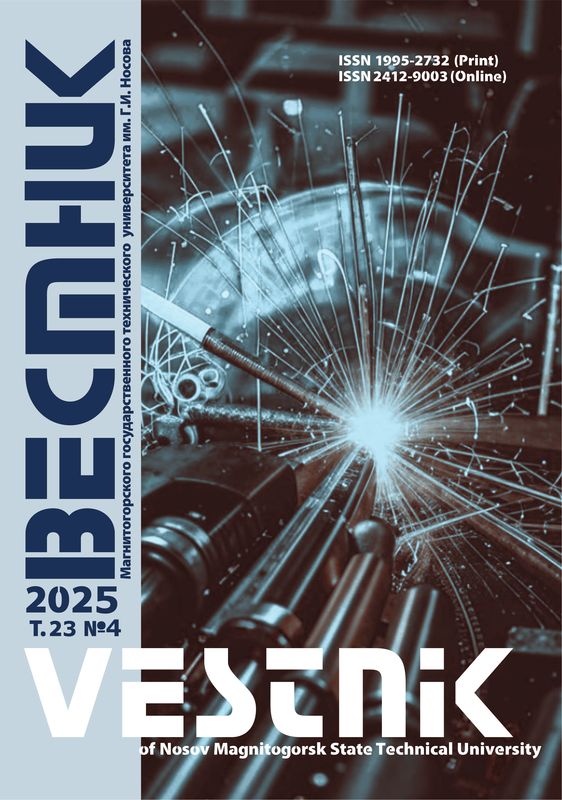DOI: 10.18503/1995-2732-2020-18-1-40-48
Abstract
Research in the field of functional nanomaterials is of relevance for the future development of technologies that are based on electrical-into-thermal energy conversion. This paper describes a study that looked at the temperature regimes of pilot self-regulating electric heaters. The paper describes a technique for the manufacture of silicone modified with carbon nanotubes and graphite, as well as a method for mounting electrodes designed to connect pilot self-regulating electric heaters. A study was conducted to understand the distribution of the temperature field on the surface of electric heaters designed as flat plates with the following dimensions: 50×50×2 mm and 60×40×2 mm. The dynamics of the direct electric current flowing in the electric heater was studied in relation to the ambient temperature. It has been established that the operating voltage for electric heaters depends on the concentration of carbon nanostructures and graphite. Concentrations of fillers containing carbon nanostructures were established that would be optimum for 12 and 24 V DC heaters. Through thermogram analysis done with a special software programme, temperature distribution charts were built, and the temperature regimes were analyzed for heaters with different concentrations of carbon nanostructures. Temperature dependences of power are described for the pilot 12 and 24 V DC heaters. For the 24 V DC heater, the heat dissipation power was 3 W, while the maximum heating temperature would reach 70°C. The power of the 12 V DC pilot heater was 8.3 W. The temperature dependence of the heater power indicates a nonlinear dependence between the temperature and the material resistance and characterizes it as a self-regulating material.
Keywords
Silicone, carbon nanotubes, heater, self-regulation, temperature.
For citation
Shchegolkov A.V., Yagubov V.S. Heat Generated by a Nanomodified Composite Made with Silicone and a CNT/Graphite Filler. Vestnik Magnitogorskogo Gosudarstvennogo Tekhnicheskogo Universiteta im. G.I. Nosova [Vestnik of Nosov Magnitogorsk State Technical University]. 2020, vol. 18, no. 1, pp. 40–48. https://doi.org/10.18503/1995-2732-2020-18-1-40-48
1. X. Yao, S.C. Hawkins, B.G. Falzon. Carbon. 136, 130 (2018). DOI: https://doi.org/10.1016/j.carbon.2018.04.039.
2. Z. Wang, D. Gao, B. Diao, L. Tan, W. Zhang and K. Liu. Appl. Therm. Eng. 160, 114105 (2019). DOI: https://doi.org/10.1016/j.applthermaleng.2019.114105.
3. J. Kang, H. Kim, K.S. Kim, S.K. Lee, S. Bae, J.H. Ahn, Y.J. Kim, J.B. Choi, B.H. Hong. Nano Lett. 11 (12) 5154 (2011). DOI: https://doi.org/10.1021/nl202311v.
4. K.T.L. Trinh, W. Wu, N.Y. Lee. Sensor. Actuat. B-Chem. 190, 177 (2014). DOI: https://doi.org/10.1016/j.snb.2013.08.056.
5. T.K. Hei, J.D. Raal. AIChE J. 55 (1) 206 (2009). DOI: https://doi.org/10.1002/aic.11685.
6. M. Nakahara, T. Murakami. J. Appl. Phys. 45 (9), 3795 (1974). DOI: 10.1063/1.1663862.
7. D. Mächler, R. Schmidt, J. Töpfer. J. Alloy. Compd. 762, 209 (2018). DOI:10.1016/j.jallcom.2018.05.049.
8. S. Chatterjee, B.D. Stojanovic, H.S. Maiti. Mater. Chem. Phys. 78 702 (2003). DOI: https://doi.org/10.1016/S0254-0584(02)00381-4.
9. V. Paunović, V. Mitić, V. Pavlović, M. Miljković, L. Živković. Process. Appl. Ceram. 4 253 (2010).
10. M.M. Vijatović Petrović, J.D. Bobić, R. Grigalaitis, B.D. Stojanović, J. Banys. Acta Phys. Pol. A. 124 155 (2013). DOI: 10.12693/APhysPolA.124.155.
11. J.R. Potts, D.R. Dreyer, C.W. Bielawski, R.S. Ruoff. Polymer. 52 (1) 5 (2011). DOI: https://doi.org/10.1016/j.polymer.2010.11.042.
12. F. El-Tantawy, K. Kamada, H. Ohnabe. Mater. Lett. 56 (1–2) 112 (2002). DOI: https://doi.org/10.1016/S0167-577X(02)00401-9
13. A. Celzard, E. McRae, C. Deleuze, M. Dufort, G. Furdin, J.F. Mareche. Phys. Rev. B 53 (10) 6209 (1996). DOI: https://doi.org/10.1103/PhysRevB.53.6209
14. S.H. Munson-McGee. Phys. Rev. B 43 (4) 3331 (1991). DOI: https://doi.org/10.1103/PhysRevB.43.3331
15. S. Isaji, Y. Bin, M. Masaru. Polymers. 50 (4) 1046 (2009). DOI: https://doi.org/10.1016/j.polymer.2008.12.033.
16. S. Ghosh, S. Dutta, E. Gomes, D. Carroll, R. D'Agostino, J. Olson, M. Guthold, W.H. Gmeiner. ACS Nano. 3 (9) 2667 (2009). DOI: https://doi.org/10.1021/nn900368b.
17. R. Sengupta, M. Bhattacharya, S. Bandyopadhyay, A.K. Bhowmick. Prog. Polym. Sci. 36 (5) 638 (2011). DOI: https://doi.org/10.1021/nn900368b.
18. A. Yoshida, Y. Hishiyama, M. Inagaki. Carbon. 29 (8) 1227 (1991). DOI: https://doi.org/10.1016/0008-6223(91)90040-P.
19. G.C. Chung, H.J. Kim, S.I. Yu, S.H. Jun, J.W. Choi, M.H. Kim, J. Electrochem. Soc. 147 (12) 4391 (2000). DOI: 10.1149/1.1394076.
20. A.S. Patole, S.P. Patole, S.Y. Jung, J.B. Yoo, J.H. An, T.H. Kim. Eur. Polym. J. 48 (2) 252 (2012). DOI: https://doi.org/10.1016/j.eurpolymj.2011.11.005.
21. S.R. Dhakate, S. Sharma, N. Chauhan, R.K. Seth, R.B. Mathur. Int. J. Hydrogen Energy 35 (9) 4195 (2010). DOI: https://doi.org/10.1016/j.ijhydene.2010.02.072.
22. S.P. Bao, G.D. Liang, S.C. Tjong. IEEE Trans Nanotechnol. 8 (6) 729 (2009). DOI: 10.1109/TNANO.2009.2023650.
23. J.H. Lee, S.K. Kim, N.H. Kim. Scripta Mater. 55 (12) 1119 (2006). DOI: https://doi.org/10.1016/j.scriptamat.2006.08.051.
24. Sabet M., Soleimani H. IOP Conf. Ser.: Mater. Sci. Eng. 64 012001 (2014). DOI: 10.1088/1757-899X/64/1/012001.
25. L. Yang, S. Lia, X. Zhou, J. Liu, Y. Lia, M. Yang, Q. Yuan, W. Zhang. Synthetic Met. 253 122 (2019). DOI: https://doi.org/10.1016/j.synthmet.2019.05.008
26. B.G. Soares, L.F. Calheiros, A.A. Silva, T. Indrusiak, G.M. Barra, S. Livi. J. Appl. Polym. Sci. 135 (24) 45564 (2018). DOI: https://doi.org/10.1002/app.45564.
27. A. Gao, F. Zhao, F. Wang, G. Zhang, S. Zhao, J. Cui, Y. Yan. Compos. Part A-Appl. S. 122 1 (2019). DOI: https://doi.org/10.1016/j.compositesa.2019.04.019.
28. S.K. Jain, Y. Tadesse. Int. J. Nanosci. Ser. 18 (05) 1850026 (2018). DOI: https://doi.org/10.1142/S0219581X18500266.












